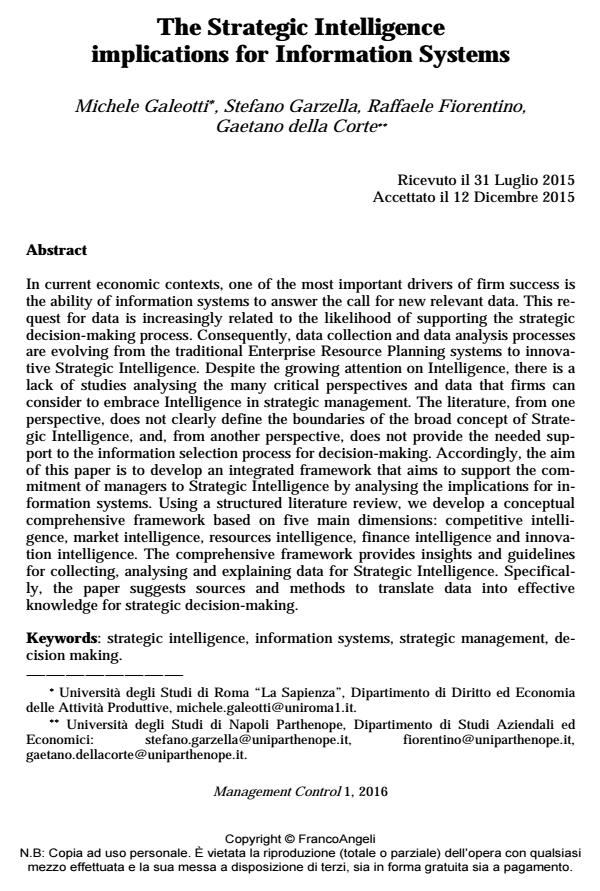The Strategic Intelligence implications for Information Systems
Titolo Rivista MANAGEMENT CONTROL
Autori/Curatori Michele Galeotti, Stefano Garzella, Raffaele Fiorentino, Gaetano della Corte
Anno di pubblicazione 2016 Fascicolo 2016/1
Lingua Italiano Numero pagine 19 P. 105-123 Dimensione file 156 KB
DOI 10.3280/MACO2016-001007
Il DOI è il codice a barre della proprietà intellettuale: per saperne di più
clicca qui
Qui sotto puoi vedere in anteprima la prima pagina di questo articolo.
Se questo articolo ti interessa, lo puoi acquistare (e scaricare in formato pdf) seguendo le facili indicazioni per acquistare il download credit. Acquista Download Credits per scaricare questo Articolo in formato PDF

FrancoAngeli è membro della Publishers International Linking Association, Inc (PILA), associazione indipendente e non profit per facilitare (attraverso i servizi tecnologici implementati da CrossRef.org) l’accesso degli studiosi ai contenuti digitali nelle pubblicazioni professionali e scientifiche.
In current economic contexts, one of the most important drivers of firm success is the ability of information systems to answer the call for new relevant data. This request for data is increasingly related to the likelihood of supporting the strategic decision-making process. Consequently, data collection and data analysis processes are evolving from the traditional Enterprise Resource Planning systems to innovative Strategic Intelligence. Despite the growing attention on Intelligence, there is a lack of studies analysing the many critical perspectives and data that firms can consider to embrace Intelligence in strategic management. The literature, from one perspective, does not clearly define the boundaries of the broad concept of Strategic Intelligence, and, from another perspective, does not provide the needed support to the information selection process for decision-making. Accordingly, the aim of this paper is to develop an integrated framework that aims to support the commitment of managers to Strategic Intelligence by analysing the implications for information systems. Using a structured literature review, we develop a conceptual comprehensive framework based on five main dimensions: competitive intelligence, market intelligence, resources intelligence, finance intelligence and innovation intelligence. The comprehensive framework provides insights and guidelines for collecting, analysing and explaining data for Strategic Intelligence. Specifically, the paper suggests sources and methods to translate data into effective knowledge for strategic decision-making.
Parole chiave:Strategic intelligence, information systems, strategic management, decision making.
- Strategic performance management systems in Italian banks. A research note Francesca Francioli, in MANAGEMENT CONTROL 2/2018 pp.155
DOI: 10.3280/MACO2018-002008 - La Business Intelligence e la Business Analytics nell'era dei Big Data: una analisi della letteratura Arianna Petrosino, Daniela Mancini, Stefano Garzella, Rita Lamboglia, in MANAGEMENT CONTROL 3/2018 pp.31
DOI: 10.3280/MACO2018-003003 - Management control systems package e turnaround: un caso aziendale Cristiana Cattaneo, Sara Sonzogni, in MANAGEMENT CONTROL 1/2021 pp.151
DOI: 10.3280/MACO2021-001008 - La Network Governance a supporto dell'Open Innovation: un'analisi della letteratura Palmira Piedepalumbo, Concetta Metallo, Daniela Mancini, in MANAGEMENT CONTROL 3/2017 pp.79
DOI: 10.3280/MACO2017-003006 - Applying business analytics for performance measurement and management. The case study of a software company Franco Visani, in MANAGEMENT CONTROL 2/2017 pp.89
DOI: 10.3280/MACO2017-002006 - Impatto della crisi economica su redditività e rischio finanziario delle imprese romagnole. Una cluster analysis Stefania Vignini, Tiziana De Cristofaro, in MANAGEMENT CONTROL 3/2018 pp.157
DOI: 10.3280/MACO2018-003008 - Corporate Financial Distress pp.139 (ISBN:978-1-83982-981-9)
Michele Galeotti, Stefano Garzella, Raffaele Fiorentino, Gaetano della Corte, The Strategic Intelligence implications for Information Systems in "MANAGEMENT CONTROL" 1/2016, pp 105-123, DOI: 10.3280/MACO2016-001007